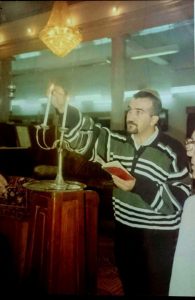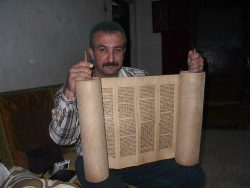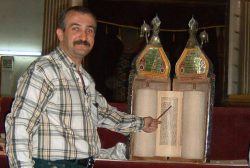Short: The Last “Rabbi” of Baghdad – A Thanksgiving Special
- 18:48
- 2019
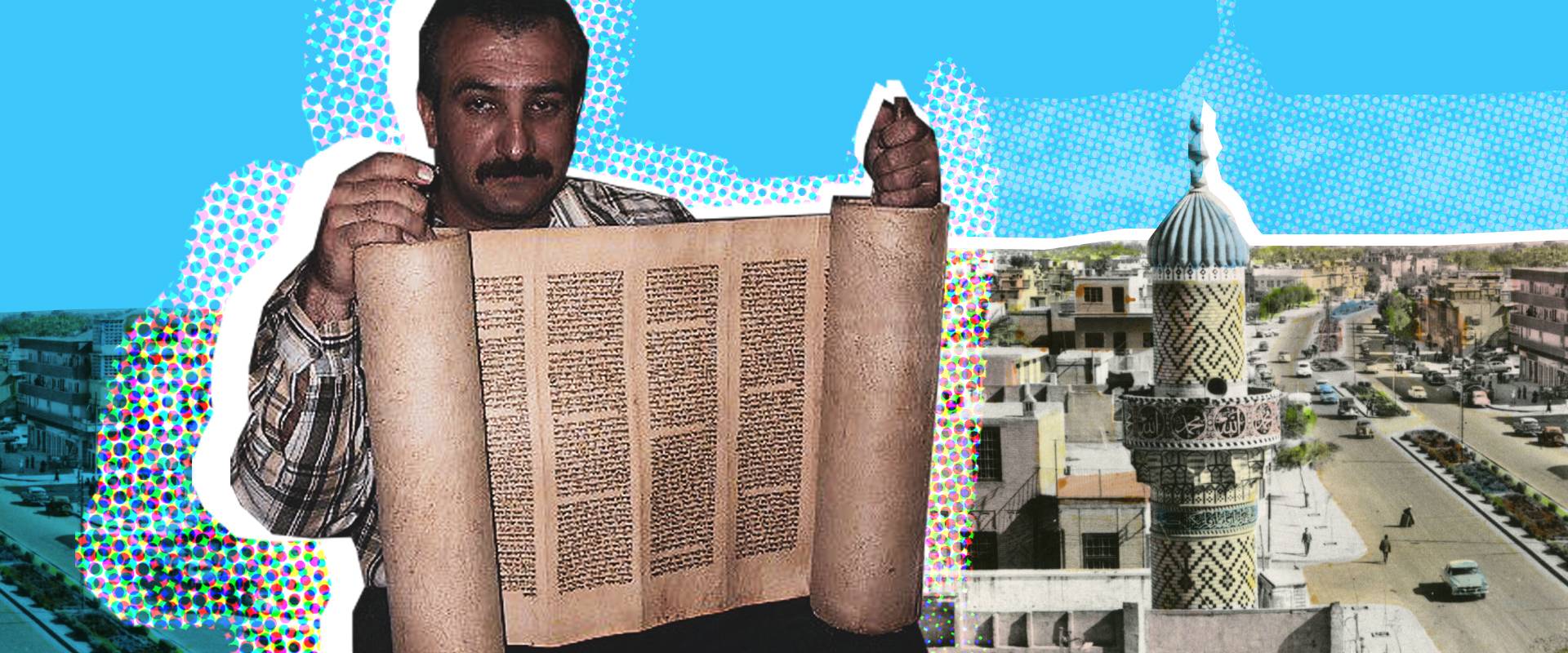
It’s a busy week. Many of you will be traveling, and those of you staying put will probably be cooking turkeys and preparing cranberry sauce. And while you are doing all that, we wanted to keep you company.
With the kind of storytelling we do, most of our interviews end up on the proverbial “editing room floor.” And we’re often sorry about that, since we’d like you to hear them too. So today, in a new experiment for us, we bring you an edited version of an interview we recently recorded. Want to know what the last “rabbi” of Baghdad is thankful for? Listen and find out.
Act 1: The Last "Rabbi" of Baghdad
Mishy Harman: I guess the first thing that I’ll ask you is can you introduce yourself?
Emad Levy: OK, I am Emad Ezra Levy. I was leader of the Jewish community in Baghdad, and the slaughter and the rabbi [Mishy laughs] at the same time, and I have a lot of jobs there.
Mishy Harman (narration): As often happens, the best one-liner was said off-tape. When I asked Emad if he ever thought of changing his name, he immediately smiled. “Are you crazy?” he said. “It’s the best name in the world. Just think about it – I’m one-of-a-kind. All the other Emads are Arabs, so none of them is a Levy, and all the other Levys are Jews, so none of them is an Emad.” Alright, back to the conversation.
Emad Levy: I was born in Baghdad in 1965.
Mishy Harman: So your parents didn’t leave with the majority of the Jews?
Emad Levy: Yeah, yeah. The family of my father, all of them, they left, except my father. He refused to leave.
Mishy Harman: Why?
Emad Levy: He said, “my life is here, I know the people, I feel comfortable, it’s good for me.”
Mishy Harman: When you were born how many Jews were there in Baghdad?
Emad Levy: Maybe five thousand, something like that.
Mishy Harman: And did you live like in a Jewish neighborhood or… who were your neighbors?
Emad Levy: No, most of the neighborhood was Muslim. I feel that’s regular. I studied in Baghdad, and I have a lot of friends of Muslim and Christian, and Jewish too. Everything is OK.
Mishy Harman: Did you go to a Jewish school?
Emad Levy: Until five class. And after that they closed the school and we go to the public school.
Mishy Harman: In Arabic?
Emad Levy: Everything it’s in Arabic. We have no Hebrew in the school, but we have English and French. I can read Hebrew but I can’t talk in Hebrew.
Mishy Harman: Ah ha. Who taught you to read Hebrew?
Emad Levy: My father, he had a record, and we listened, how you can pronounce the word. I tried to imitate, and after that we tried to pray.
Mishy Harman: But you always felt that you were, I mean, a Jew?
Emad Levy: Of course. We went to the synagogue, I know I am Jewish, and I feel I am Jewish, and I love Jewish. [Mishy laughs].
Mishy Harman: So my understanding is that after the Six Day War in Israel, after ’67, suddenly the situation of the Jews became much more difficult in Iraq?
Emad Levy: Yeah, of course, of course. After ’67 it’s more difficult, because Israel won the war, and they tried to revenge from the Jewish Iraqi in Iraq.
Mishy Harman: And a lot of people were arrested, some people were even executed.
Emad Levy: Yeah. Yeah.
Mishy Harman: And then what happened to the community in the next thirty years?
Emad Levy: During the years of ’70, the people, they tried to get out of Iraq. In 1980, maybe we’re only two hundred Jewish people in Iraq.
Mishy Harman: As the Jewish community was getting smaller and smaller, did you still go to the synagogue?
Emad Levy: Of course. Of course.
Mishy Harman: And did synagogues close as a result?
Emad Levy: At that time I have only one synagogue. Mishy Harman: One?
Emad Levy: One.
Mishy Harman: Wow. And what did you know about Israel growing up?
Emad Levy: At that time, I’m not know anything about Israel.
Mishy Harman: The television and the radio in Baghdad, would they give any information or news about Israel?
Emad Levy: The news that they want.
Mishy Harman: Emm-hmm.
Emad Levy: But my father was… listen to the ‘Voice of Israel.’
Mishy Harman: Your father knew Hebrew? He could understand what…
Emad Levy: No! It’s in Arabic! The ‘Voice of Israel’ in…
Mishy Harman: Oh, Kol Yisrael in Arabic?
Emad Levy: In Arabic, yeah. But in a low volume, he put ear on the radio, because they have no…
Mishy Harman: Earphones.
Emad Levy: At that time, ein earphones. They listened to all… what’s happened in the war, in ’67 and ’73. All the times they listened to the ‘Voice of Israel.’
Mishy Harman: And that’s how they knew what was going on?
Emad Levy: Yeah, yeah.
Mishy Harman: Because of course there was no internet…
Emad Levy: Yeah.
Mishy Harman: And no email and…
Emad Levy: You know, all the time they listened to the radio. In 1992, the intelligence put me in the blacklist, not because I’m bad, they want me to stay because I help the Jewish community in a lot of things. When someone died, they need one person to know how to prepare everything. And I was the one who did all this, without money.
Mishy Harman: So how did you get involved in doing these kinds of things for the Jewish community?
Emad Levy: Because most of them, it’s old. They need some young people to do this jobs.
Mishy Harman: And you said that you became the butcher? The slaughterer?
Emad Levy: I was the slaughterer, I don’t like this job. But I learned because maybe the last slaughterer, maybe they left Iraq in any time. I want to continue Jewish to have the kosher food, kosher meat, for that reason I try to do it. I don’t like it. [Laughter].
Mishy Harman: So the previous shochet taught you how to become a shochet?
Emad Levy: Yeah, he learned me, and I learned like the halacha; what’s the principle of the Jewish.
Mishy Harman: And did the last shochet leave and then you became the shochet?
Emad Levy: Yeah. He left Iraq in 2002.
Mishy Harman: So you became the shochet?
Emad Levy: Yeah, the slaughterer, yeah.
Mishy Harman: The slaughterer. And the rabbi?
Emad Levy: I was the honor rabbi, I do the services when someone dies, you must read in the cemetery. And I tried to do the services in the synagogue.
Mishy Harman: So would you read from the Torah?
Emad Levy: Yeah, I learned.
Mishy Harman: So basically you… every time somebody left who had some sort of job within the community, you just took over that job.
Emad Levy: We must serve.
Mishy Harman: So it was a good thing that the community had you, otherwise they’d be completely lost!
Emad Levy: Yeah, yeah, yeah. I feel I have a lot of responsibility, but I’m glad to help. I’m glad, I’m so glad.
Mishy Harman: So how did you become the leader of the community?
Emad Levy: We have election.
Mishy Harman: How many Jews were there at this point in Baghdad?
Emad Levy: In 2003? Thirty-four.
Mishy Harman: Thirty-four Jews?
Emad Levy: Yeah. Not all the thirty-four, they came to vote.
Mishy Harman: Ah ha.
Emad Levy: But most of them, they want me, because they know I can help the Jewish community.
Mishy Harman: So you were elected to be the actual leader.
Emad Levy: Yeah, yeah. I fix the cemetery, I fix after that the synagogue, the shelter of the old men and women.
Mishy Harman: Emm hmm.
Emad Levy: In 2003..
Mishy Harman: Yeah?
Emad Levy: I closed to synagogue.
Mishy Harman: You closed it?
Emad Levy: I closed it because I’m afraid they put some bombs and they destroyed all the synagogue and the people.
Mishy Harman: You were afraid that who was gonna bomb the synagogue?
Emad Levy: Maybe the Al Qaeda, maybe the people that work with Iran.
Mishy Harman: Did you get married?
Emad Levy: In Iraq? No. We have no women. The last marriage in Iraq in 1978, and that’s all.
Mishy Harman: When you say “there was no women” you mean there were no Jewish women?
Emad Levy: No Jewish women!
Mishy Harman: Aha. And did you have ummm… did you have Muslim girlfriends?
Emad Levy: It’s not like here, the girlfriend. Maybe you talk with her on the phone, maybe once you go outside. [Mishy laughs]. It’s so terrible, it’s not like here. In 2003, my father change her mind, he want to go to the Israel, yeah…
Mishy Harman: How old was he, then?
Emad Levy: Eighty-three.
Mishy Harman: So what was it like for your father to make it to Israel? What did he say?
Emad Levy: He said, “I’m happy I live in Gan Eden,” yeah.
Mishy Harman: [laughs] Paradise.
Emad Levy: Paradise, yeah.
Mishy Harman: Even though your father was now coming to Israel, you still decided to stay in Baghdad?
Emad Levy: No, I’m not decided to stay. I was the leader of the Jewish community, I have a lot of responsibility on the Jewish community. I can’t leave. I want to leave.
Mishy Harman: Emm hmm.
Emad Levy: Don’t believe I’d like to stay in Iraq. I have nothing in Iraq, what I have? I have no future. What the future? I can’t married, I can’t do anything. Mishy Harman: Emm hmm.
Emad Levy: In 2003 they… I receive a envelope. It was a threat “you are Jewish, we’ll slaught you.” My dear friends, Muslims, they gave me guards and police. But now the situation, it’s so danger. We are afraid, and you are alone. I told them, “OK, help me to get a passport, and I leave Iraq without anything.”
Mishy Harman: Emm hmm.
Emad Levy: That what I did.
Mishy Harman: So when did you leave Iraq? What year?
Emad Levy: 2010.
Mishy Harman: 2010?
Emad Levy: Yeah.
Mishy Harman: And was that the first time that you ever left Iraq?
Emad Levy: Yeah, because I have no passport at that time. The intelligence did not accept to get me a passport.
Mishy Harman: Since you were basically the community. I mean you were everything for the community did you feel that…
Emad Levy: We were… I think we were eight, only eight people in the community.
Mishy Harman: Did you feel bad about leaving them there and going…
Emad Levy: No. It my dreams to go to Israel, to the Holy Land.
Mishy Harman: How did you come to Israel?
Emad Levy: I fly to Jordan, from Jordan the embassy of Israel, they help me.
Mishy Harman: What was it like for you the first time that you saw Israel?
Emad Levy: I can’t tell you what I feel, it’s to feel you are safe in your country.
Mishy Harman: And have you been back to Iraq since then?
Emad Levy: No, of course not.
Mishy Harman: Would you like to go back?
Emad Levy: No. They’ll slaught me! Most of the people they know I’m a VIP, [Mishy laughs] I’m not a regular person. They can search on Google, they read about me, they saw all my pictures in Iraq. They slaught me.
Mishy Harman: And now do you think of yourself as an Israeli or as an Iraqi, or both?
Emad Levy: I’m Israeli, I’m Jewish, but my roots from Iraq.
Mishy Harman: And you met an Iraqi woman here in Israel, who’s now your wife?
Emad Levy: My wife, she was born here, in Israel, but her father and mother were from Iraq, yeah.
Mishy Harman: How old were you when you got married?
Emad Levy: Forty-seven. Not young! I spent all the times in Iraq. Yeah.
Mishy Harman: Do you still have friends in Iraq?
Emad Levy: Yeah, I’m in contact with my friends, of course.
Mishy Harman: What do you… I mean I’m sure there’s a lot of things that you miss about Iraq; certain foods, or certain restaurants that you like, or sports teams, or friends, or…
Emad Levy: We have everything here. And the most important we have the kosher food here, in Israel.
Mishy Harman: [Laughs]. Do you miss Iraqi hummus?
Emad Levy: I’m not eat hummus, I don’t like it.
Mishy Harman: And how many Jews are left today in Baghdad?
Emad Levy: Five, only five.
Mishy Harman: Five!
Emad Levy: That’s all.
Mishy Harman: Five Jews left, wow.
Emad Levy: Yeah.
Mishy Harman: Who are they? Old people?
Emad Levy: Emmm… Fifty-seven until ninety. Yeah.
Mishy Harman: So when those five people die, that’s it, there will be no more Jews in Baghdad?
Emad Levy: We can’t expect anything, you don’t know.
Mishy Harman: And now you feel that your job there is done?
Emad Levy: Now [chuckles] I’m out of Iraq.
Mishy Harman: And you feel good?
Emad Levy: Baruch HaShem.
Mishy Harman: Emad I have one last question, so you know we’re going to air this on the radio right before the American holiday of Thanksgiving, do you know that holiday?
Emad Levy: Yeah, Thanksgiving, yeah.
Mishy Harman: And you know, a lot of people, when they have their Thanksgiving meals, they go around the table and each one says what they’re thankful for. So if I asked you “what are you thankful for” what would you say? What are you thankful for?
Emad Levy: I’m thankful… I’m in Israel, it’s a big miracle. I have a wife and I have a child. I’m working here. I’m with all the Jewish, like a big family here in Israel. Thanks God, to help me to be in Israel.
Mishy Harman: Yoffi. Toda toda Emad.
Emad Levy: Ein al ma.
Mishy Harman: Yoffi. Yoffi.
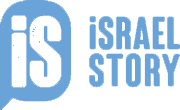
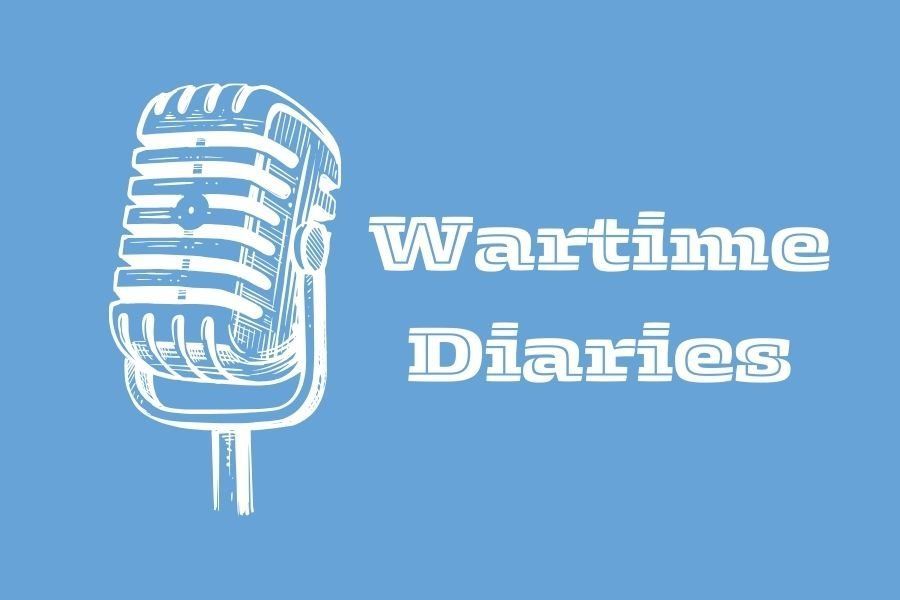 Wartime Diaries
Wartime Diaries
